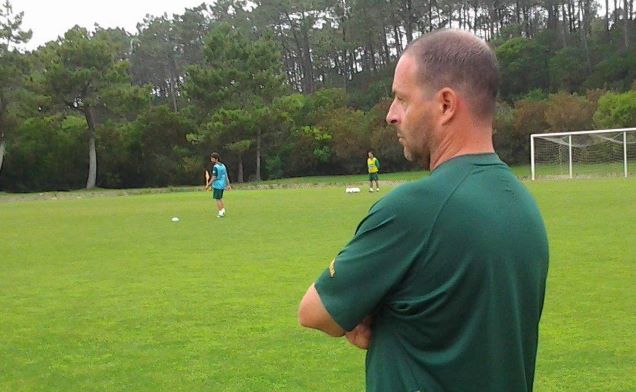

“I’m trying to be the coach for the future”
In the most recent instalment of Soccer Hub’s interview series, viewers from around the world were treated to a compelling conversation between our very own Ricardo and special guest Luís Gonçalves, recently-appointed head coach of the Mozambique national team.
In his new position, Luís has achieved instant success – his side beat Mauritius by an aggregate score of 3-0 in a two-legged preliminary World Cup qualifier. Ahead of his third game at the helm – a friendly against Kenya on the 13th of October – Luís spoke to Soccer Hub about the challenges of international management, the transition from youth to senior coaching, and the culture of African football.
Asked about his objectives in the Mozambiquean game, Luís stressed his desire for co-operation throughout all levels of the game in the country – to:
“build a network; for example, from scouting, from the coaching education, from the youth teams”.
With a background in junior coaching having held positions with Sporting Lisbon, Porto, and in the Chinese youth setup, Luís’ expressed his enthusiasm for sporting education with intelligence and clarity. When Ricardo inquired as to what coaches in Mozambique need to hone their skills, for instance, Luís stated that “coaches, they know about the game, they know about football in general, but sometimes they need more specific knowledge about development issues. He includes himself in this observation, humbly proffering that “we [coaches] don’t know everything – when I came to a project like this I said ‘I’m not here to teach, I’m here to learn with you, also'”.
International management at a senior level is a new venture for Luís. With this in mind, Ricardo challenged the Maputo born coach on the main distinctions between domestic and national coaching. Luís remarked that defining characteristics revolve around the amount of time one has to spend with their players in the respective lines of work.
“You can’t forget the players are from different clubs”, he said. “You try to implement your game model,” but “you can’t forget the players are from different clubs”.
The point being that, while in international management time with your players is fleeting, in the club game matches are “once a week, twice a week – so you can evaluate”.
To combat this Luís stresses the pivotal nature of scouting – “if you don’t have it, you need to build a strong network of scouts… you need to take many hours a day to watch the matches and to analyse the players” Equally important, for Luís, is choosing “the best players” at the “right time”. If a player has played three games in a week, for example, it might be best for him to sit-out an upcoming international fixture lest he be a detrimental factor to the team.
Is coaching at youth level a pre-requisite for coaching at a senior level? Not in Luís’s opinion -“I don’t think it’s an obligation”. “In my case, my background is good”, he went on. “I feel it is helpful because I grew up as a coach in coaching youth teams, that background gives me a different point of view”.
One of the main challenges for coaches adapting to a new environment, perhaps in a different country or a different set of players, is the issue of different cultures. When asked about whether it’s possible for Asian or European coaches to enjoy the same success as African coaches in their native continent, Luís was definitive: “yes, of course”. Expanding on his point, he said,
“if you have a good structure with organization, with money, it’s easier” but, he stated, “for me, success is a question of mentality and attitude”.
He suggested that it is sensible to try and adapt to one’s environment but also to “put our ideas on the field”.
“If you can change ideas, you can learn a lot” – Luís on the importance of flexibility to good coaching. This is something we see emphasized time and time again here at Soccer Hub, the willingness to adapt and to learn. This flexibility is especially relevant to international management in which a more holistic approach might be necessary in order to get the most out of your players in the limited amount of time you have at your disposal. In reference to this, Luís talked about how he adopts an all-encompassing attitude when taking training – “as a coach, I work the mental, the physical, the tactical, the technical, everything”.
There is a misconception in the footballing world that Africa’s lack of facilities causes them to lag behind, but this is not the case. “We can’t forget that Africa has a very important thing, they have like we used to say ‘street football’, the kids play on the street, the kids play on the field. In Europe, in Portugal, for example, nowadays you don’t see that”. While he acknowledges that Africa “needs the fundamentals”, he is also clearly passionate about the continent’s love for the game.
“I’m trying to be the coach for the future”, Luís said with a smile.
That coach, in his view, needs “an open mind, to understand environment and the players and the structure”. Of course, these qualities are among the most important any aspiring coach should look for in themselves.
Whatch the full interview bellow:
If you whant to know more about soccer coaching, take one of our courses: www.hub-soccer.com
Follow us on Facebook!
Categories
Latest Courses
-
9 Lessons
-
1 Lesson
-
6 Lessons
You May Also Like
-
-
October 21, 2025
-
-
October 13, 2025
-
-
October 12, 2025



